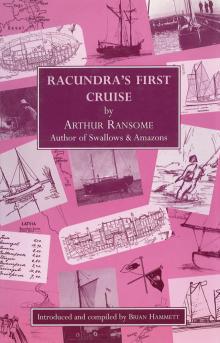- Home
- Arthur Ransome
Great Northern?
Great Northern? Read online
CONTENTS
Cover
Title Page
Maps
Illustrations
Dedication
Epigraph
Note
I. THE SEA BEAR
II. FEELING HER WAY IN
III. PUTTING HER ON LEGS
IV. THE FIRST DISCOVERY
V. “WE ARE BEING STALKED!”
VI. FIRST SIGHT OF THE BIRDS
VII. IS IT OR ISN’T IT?
VIII. “HE’S STILL THERE!”
IX. CROSS PURPOSES
X. MUTINY ABOARD
XI. THE EGG-COLLECTOR COOKS HIS OWN GOOSE
XII. WAITING FOR A CHANCE
XIII. GIVING HIM THE SLIP
XIV. “I’VE GOT TO HAVE A HIDE”
XV. INTERRUPTED NETTING PARTY
XVI. A GOOD LOOK-OUT
XVII. ENEMIES AFLOAT AND ASHORE
XVIII. NIGHT VISIT TO THE ISLAND
XIX. A CLEAR COAST FOR DICK
XX. THE DECOYS
XXI. THE RED HERRINGS
XXII. THE ROUND-UP
XXIII. SHIP’S NATURALIST
XXIV. UNWANTED RESCUER
XXV. ROGER’S DULL DAY
XXVI. THE McGINTY LISTENS TO REASON
XXVII. TOO LATE!
XXVIII. “BUT WHAT HAS HE DONE WITH THE EGGS?”
XXIX. “QUICK! QUICK!”
About the Author
Also by Arthur Ransome
The Arthur Ransome Society
The Arthur Ransome Trust
Copyright
ILLUSTRATIONS
SCRUBBING THE SEA BEAR
MAC’S CHART OF THE COVE
INTO THE MIST
HOW LEGS WORK
A PAGE FROM DICK’S NOTEBOOK
DICK GOES OFF TO THE LOCHS
ANOTHER PAGE FROM DICK’S NOTEBOOK
IN THE CABIN OF THE PTERODACTYL
MR JEMMERLING COMES ABOARD
THE SEARCHLIGHT
PORTAGE
GREAT NORTHERN DIVER
PEGGY AT THE CROSS-TREES
THE SLEEPING BEAUTY
SO FAR, SO GOOD…
IN THE HIDE
TOO CLOSE A VIEW
MAP SHOWING THEIR TRACKS
A HAND AT HIS COLLAR
ROGER AT THE PRISON DOOR
THE McGINTY AND HIS PRISONERS
CAPSIZE OF THE FOLDING BOAT
FAREWELL TO THE SEA BEAR
SCRUBBING THE SEA BEAR
To
MYLES NORTH
who, knowing a good deal of what happened, asked me to write the full story
The Great Northern Diver
“nests abroad … usually seen solitary”
SANDARS
“nests in eastern America, Greenland and Iceland”
“may nest in the Shetlands, as it is often round these
islands all summer, but this has never been proved”
COWARD
Every effort has been made (short of falsifying the course of events) to prevent the inquisitive reader from learning the exact place where the Sea Bear was scrubbed and the Ship’s Naturalist made his discovery. Persons who pester the author for more information (whether or not they enclose stamped envelopes with their letters) will not be answered. Further, should anyone with particular knowledge of the Hebrides identify the loch where the Divers are nesting and be the means of disturbing them, they will make enemies of John, Susan, Titty, Roger, Nancy, Peggy, Dorothea and Dick, as well as of the author, who will in that case he sorry he has written this account of what happened.
CHAPTER I
THE SEA BEAR
ON A HILL above the cliff a boy in Highland dress turned from watching the deer in the valley to look out over the sea. He saw a sail far away. It was no more than a white speck in the distance and presently he turned his back on it and settled down again to watch the deer.
The Sea Bear, with Nancy at the tiller, was lolloping comfortably along in bright sunshine, heading towards the rocky coast of one of the islands of the Hebrides. She was an old Norwegian pilot cutter and had been borrowed by Captain Flint (Nancy’s and Peggy’s Uncle Jim) for himself and his crew of Blacketts, Walkers and Callums. The Minch can be a stormy sea, but they had been lucky in their weather and now after a happy fortnight of good sailing with almost every night spent in a different harbour they were going to put her aground in a sheltered cove, scrape off the barnacles and weed, put a fresh coat of paint on her below the water-line and take her back to the port on the mainland from which they had started, to hand her over to her owner all spick and span and ready for him to take to sea again at once.
“Nobody much likes lending boats,” Captain Flint had said. “The least we can do is to let Mac have her back better than before we had her.”
“Then, perhaps, he’ll lend her to us again,” Roger had agreed.
Nancy was at the tiller. Peggy, her mate and sister, was in the cockpit beside her, ready to give a hand with a rope if need be. Captain Flint was smoking a pipe, sitting on the cabin skylight, watching for the square-topped hill that would show them the way to the cove they had to find. Roger was sitting on the forehatch, keeping a look out and wondering how soon the others would agree that the wind, which had been dropping since the early morning, had weakened so far that it would be worth while to start the engine. The rest of the crew were down below, in the cabin, except for Susan, who had been keeping an eye on the clock and had just gone forward into the fo’c’sle, to light a Primus stove and to put a kettle on it for the ship’s company’s tea.
The cabin had been little changed since the days when the Sea Bear had been a working pilot cutter. There were still the six berths of the pilots, built as it were in the walls of the ship, above the long settees. Going to bed, as Titty had said, was like getting into a rabbit hutch. But, once you were in, you could shut yourself off from everybody else by pulling a curtain across. Many a tired pilot must have slept in one of those bunks while the other pilots, only a yard or two away, were playing cards with each other under the cabin lamp. Further aft were two more bunks, one on each side, close to the companion ladder and handy for going on deck. They had been used in old days by the men whose business it was to take the cutter to sea to meet the big ships coming in, put pilots aboard them and pick up other pilots from the big ships outward bound. John and Captain Flint slept in these bunks. Nancy, Peggy, Susan, Titty, Dorothea and Dick had each one of the cupboard bunks in the main cabin while Roger, being the smallest, had a bunk in the fo’c’sle which once upon a time, no doubt, had belonged to a Norwegian ship’s boy.
John, feet wide apart to steady himself, was leaning over the chart table by the companion ladder, looking now at the big chart that showed the coasts on both sides of the Minch, the Scottish mainland and the Outer Hebrides, and now at a much smaller chart that showed in detail the tiny cove for which the ship was making. Mac, the owner of the Sea Bear, had left a lot of these little charts aboard her. John and Nancy spent happy hours looking through them and, when Captain Flint had said that he meant to give the ship a scrub before handing her over they had brandished this particular chart before him. “Look at this,” Nancy had said. “Mac didn’t bother about taking her to a harbour for scrubbing. Look at that anchor and look at that cross and what he’s scribbled in pencil in the margin … ‘Scrubbed Sea Bear’… Let’s do the same. She’s got her own legs. There’s no need to take her into a harbour and lean her up against a pier.” Rather unwillingly, Captain Flint had agreed.
Titty was lying on her stomach in her cupboard bunk, sucking a pencil and bringing up to date her private log of the voyage, a rather different log from the business-like one kept by John and Nancy, which was all courses and distances run and remarks on changes
of wind and weather. It was a good deal easier to write lying on your stomach in a bunk than sitting at the cabin table while the Sea Bear was crashing her way to windward. (Not that she was crashing very hard at the moment, with only a failing wind to drive her, but there had been times when she had crashed very hard indeed and Titty had got into the way of writing her log in her bunk.) Dorothea was also writing, but her writing had nothing to do with what happened aboard ship. She had wedged herself into a corner by the mast, leaning back against the bulkhead that divided cabin from fo’c’sle, and was making up her mind whether the villain in her new story should have a black beard and ear-rings or be clean-shaven with a scar across his cheek.
Dick, who had been appointed Ship’s Naturalist, was sitting on the starboard settee, with a pencil in one hand while with the other he was keeping the Pocket Book of Birds and his notebook from sliding off the cabin table. He was making a list of the birds seen during the cruise and telling himself that the voyage had been a success in spite of his disappointment at not seeing the particular birds for which he had been keeping a look-out. “I say,” he had said when he had first heard of the northern port from which they were sailing and the islands they were to visit, “we’ll be seeing Divers.” “With brass helmets,” Dorothea had said, “going down under the sea and coming up with bars of gold from sunken wrecks.” “Not that kind of Diver,” he had explained. “Birds. Red-throated and Black-throated. We might even have a chance of seeing a Great Northern, though they’ll most of them be in Iceland by now.” All through the cruise he had been watching for them, and now, with the cruise all but over, he was consoling himself by remembering how many others he had been able to add to the list of birds he had seen with his own eyes … Gannets, guillemots, terns, petrels, fulmars, puffins, razorbills, mergansers, and so tame some of them. He was almost sure that some of his photographs of gulls would come out all right, and perhaps though it had been taken from a long way off, that one of a shag in the act of swallowing a fish. But he had seen no Divers, and if, tomorrow, they were all going to be hard at work scrubbing the ship, there would be no other chance.
“I say, John,” he asked, “you know the lakes shown on that chart? How far are they from the place where we’ll be anchored? Can I have a look?”
John dropped on the settee beside Dick and held the little chart so that they could look at it together. It showed an inlet in the coast-line, divided into two by a promontory and a line of rocks. There was flattish country to the south, a cliff and hills to the north, and inland were a number of small lochs, two of them drained by a stream that came out at the head of the cove that was marked with an anchor and a cross on the shore. On those lochs, Dick thought, there might be Divers to be seen. John was interested not in the lochs but in a neat sketch at the head of the chart showing the outline of the hills behind the coast, with a dotted line ruled straight down from one corner of a square-topped hill, and a note written beside it, “N. end of Sq. Top bearing W. ½ N. leads to cliff on N. side of Entrance.”
MAC’S CHART OF THE COVE
We put in some of the names. (Not very well. Sorry.) N.B.
There was a sudden stamp of feet on the foredeck. Roger’s voice shrilled out, “Sail HO! … At least, not sail. Motor boat … Starboard quarter.…”
It was the first vessel to be sighted that day. John, the little chart still in his hand, was up the companion ladder in a flash. Dorothea wriggled round the table to follow him. Titty rolled out of her bunk and made a dead heat of it with Dorothea. Even Susan, after a careful glance at the stove to see that the flame was neither too high nor too low, banged at the underneath of the forehatch, in case Roger was on the top of it, pushed it up and climbed out. Dick, who had glanced back to his bird-book, where it said that Black-throated Divers were to be found on mountain lochs near the coast, looked up to find that he had the cabin to himself. Everybody else was on deck.
There was a lot of chatter up there. People were taking turns with glasses and telescope. “Look here, it’s my turn now. I spotted her first.” That was Roger. “Only a motor boat, anyway.” That was John. “She’s going to pass us pretty close.” That was Nancy. “You carry on, Nancy. We’ve the right of way. You’ve nothing to worry about. She’ll pass under our stern.” That was Captain Flint. “She’s coming up a terrific lick.” That was Roger. “Probably carrying dispatches.” That was Titty. “Or taking a doctor to one of the lighthouses.” That was Dorothea.
Dick hardly heard the chatter. He was looking at the coloured pictures in his bird-book, showing the Divers he had never seen. Tomorrow would be the very last chance. The chatter on deck meant nothing to him until, suddenly, he heard his own name.
“It’s Dick’s boat.” That was Peggy’s voice. “Dick! Take a look. Where is he? Hey! Dick!”
Dorothea called down the companion ladder. “Dick! Dick! Hurry up. It’s your bird-man and he’s going to pass us quite close.”
Dick was already working his way along the slanting cabin floor and reaching for the ladder. Dorothea pushed the glasses into his hands as he came on deck. He had no need of them to recognize the bird-man’s boat. He knew her the moment he saw her, but, balancing as best he could and trying to hold the glasses steady, he used them to read at least some of the many letters of her name. “P.T.E.R.…” The Sea Bear lurched and the glasses were pointing at sky instead of boat … He swung them down and read the last lot of letters … “A.C.T.Y.L.” Yes, she was the Pterodactyl all right, on her way back. Earlier in their cruise they had seen her in that harbour on the other side of the cape and Dick had told the others what her name meant, PTERODACTYL, a sort of half-bird half-lizard, prehistoric, of course, and extinct. And then, while they were ashore, coming along the quay, all laden with provisions, they had seen her moving out, and had stopped to watch her. “Off again after his birds,” a longshoreman had said. “Shetlands, he’s bound for. Looking for birds. His fourth trip this year.” “What did you say he was?” Dick had asked. “One of those bird chaps,” the man had said. “Tell him of a rare bird and he’ll go five hundred miles, they say. Pays good money, too, to anybody who tells him where to find one.” Dick had watched the big motor yacht slip away beyond the pierheads and, after they were back aboard their ship, he had climbed the rigging to the cross-trees and caught just a glimpse of her outside, already no more than a white speck of flying spray, on her way to the far northern nesting places of the sea birds. Some day, perhaps, he too would have a boat like that. He would have a whole library of bird-books in her, and a dark room for photography, and a camera with a telephoto lens to take photographs of birds without having to come near enough to disturb them. He would have given anything to have been able to go aboard the Pterodactyl and talk with a real bird-man who was doing all the things that he, Dick, would like to do. The others had laughed at him (all except Roger, who liked engines) and had said that she was only a motor boat anyway, and that you could go to look for birds in a sailing vessel and have all the fun of sailing as well. Every time they had seen a motor boat after that, someone had said, “There’s a ship for Dick,” but he had not minded their teasing. The Pterodactyl, even if she was moved by a motor, belonged to a bird-man who was using her just as Dick would like to use a vessel of his own, big enough to live in, as a travelling observation post. With a boat like that, you could migrate with the birds.
The Pterodactyl crossed the bows of the Sea Bear with twenty or thirty yards to spare.
“Beastly rude,” said Nancy.
“Quite within his rights,” said Captain Flint. “Going at that lick, he’ll be thinking of us as practically standing still. All the same it would have been better manners not to rub it in.”
Dick, with the glasses, was trying to catch a glimpse of the bird-man himself. But the Pterodactyl was steered from inside a deckhouse and he could not see who was at the wheel. There was no one on deck as the big motor yacht drove on her way, foam flying from her bows.
“He’s probably seen lots of t
hem,” said Dick to himself.
“Seen what?” said Peggy.
“Dick’s thinking about birds,” said Dorothea.
“Divers,” said Dick.
“An hour’s time and that boat’ll be in port,” said Captain Flint, glancing into the companion at the clock that was screwed to a beam so as to be easily seen from on deck. “That is, if she’s going back to …” (For a very good reason the name of the harbour where they had first seen the Pterodactyl will not be mentioned in this book.)
“If we’re going in there to get petrol before starting across you’ll be able to see her again,” said Dorothea to her brother.
“Of course she may be going somewhere else,” said Dick.
“Let’s start our engine,” said Roger, who had come aft and had very much disliked seeing the Pterodactyl moving so much faster than the Sea Bear.
“Shiver my timbers,” said Nancy. “What are you doing here? You’re on the look out. Get away forrard and shut up about engines.”
“You’ll be calling for engines yourself pretty soon,” said Roger, and scrambled forward again. “The wind’s getting weaker and weaker.”
Captain Flint looked about him. “Roger’s about right,” he said. “Looks like a change coming. It’s a paltry wind. But there’s no petrol to spare, except just for getting in. With that calm yesterday we ran the tanks pretty nearly dry. Never mind. We haven’t got far to go. We ought to be getting a sight of that hill any time now.”
Roger was back on the foredeck. Susan was once more in the fo’c’sle watching a kettle that had begun to steam. Dick was trying not to lose the vanishing speck of the bird-man’s boat. Nancy was glancing now at the compass, now at the sails, keeping them full but not too full, intent on getting the very best out of the old cutter. All the others, Captain Flint, Peggy, Titty, Dorothea and John, were looking at the blue hills ahead of them.

 Peter Duck: A Treasure Hunt in the Caribbees
Peter Duck: A Treasure Hunt in the Caribbees Racundra's First Cruise
Racundra's First Cruise Great Northern?
Great Northern? Swallowdale
Swallowdale Swallows and Amazons
Swallows and Amazons Winter Holiday
Winter Holiday Missee Lee: The Swallows and Amazons in the China Seas
Missee Lee: The Swallows and Amazons in the China Seas Pigeon Post
Pigeon Post We Didn't Mean to Go to Sea
We Didn't Mean to Go to Sea The Firebird and Other Russian Fairy Tales
The Firebird and Other Russian Fairy Tales Coot Club
Coot Club The Big Six: A Novel
The Big Six: A Novel Six Weeks in Russia, 1919
Six Weeks in Russia, 1919 Secret Water
Secret Water The Big Six
The Big Six Missee Lee
Missee Lee Peter Duck
Peter Duck The Picts and the Martyrs
The Picts and the Martyrs